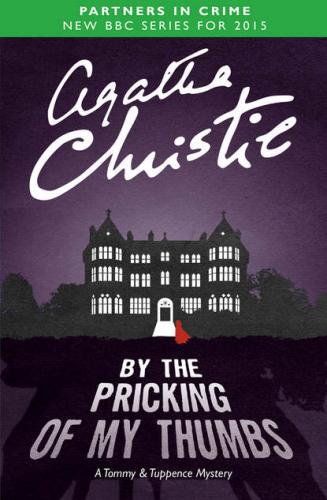Since her conscience still troubled her a little, Tuppence wrote a letter explaining how the picture had come into their possession but that if Mrs Lancaster would like it returned, she had only got to let them know. This she dispatched to Mrs Lancaster, c/o Mrs Johnson, at the Cleveland Hotel, George Street, London, W1.
To this there was no reply, but a week later the letter was returned with ‘Not known at this address’ scrawled on it.
‘How tiresome,’ said Tuppence.
‘Perhaps they only stayed for a night or two,’ suggested Tommy.
‘You’d think they’d have left a forwarding address—’
‘Did you put “Please forward” on it?’
‘Yes, I did. I know, I’ll ring them up and ask—They must have put an address in the hotel register—’
‘I’d let it go if I were you,’ said Tommy. ‘Why make all this fuss? I expect the old pussy has forgotten all about the picture.’
‘I might as well try.’
Tuppence sat down at the telephone and was presently connected to the Cleveland Hotel.
She rejoined Tommy in his study a few minutes later.
‘It’s rather curious, Tommy—they haven’t even been there. No Mrs Johnson—no Mrs Lancaster—no rooms booked for them—or any trace of their having stayed there before.’
‘I expect Miss Packard got the name of the hotel wrong. Wrote it down in a hurry—and then perhaps lost it—or remembered it wrong. Things like that often happen, you know.’
‘I shouldn’t have thought it would at Sunny Ridge. Miss Packard is so efficient always.’
‘Perhaps they didn’t book beforehand at the hotel and it was full, so they had to go somewhere else. You know what accommodation in London is like—Must you go on fussing?’
Tuppence retired.
Presently she came back.
‘I know what I’m going to do. I’ll ring up Miss Packard and I’ll get the address of the lawyers—’
‘What lawyers?’
‘Don’t you remember she said something about a firm of solicitors who made all the arrangements because the Johnsons were abroad?’
Tommy, who was busy over a speech he was drafting for a Conference he was shortly to attend, and murmuring under his breath—‘the proper policy if such a contingency should arise’—said: ‘How do you spell contingency, Tuppence?’
‘Did you hear what I was saying?’
‘Yes, very good idea—splendid—excellent—you do that—’
Tuppence went out—stuck her head in again and said:
‘C-o-n-s-i-s-t-e-n-c-y.’
‘Can’t be—you’ve got the wrong word.’
‘What are you writing about?’
‘The Paper I’m reading next at the I.U.A.S. and I do wish you’d let me do it in peace.’
‘Sorry.’
Tuppence removed herself. Tommy continued to write sentences and then scratch them out. His face was just brightening, as the pace of his writing increased—when once more the door opened.
‘Here it is,’ said Tuppence. ‘Partingdale, Harris, Lockeridge and Partingdale, 32 Lincoln Terrace, W.C.2. Tel. Holborn 051386. The operative member of the firm is Mr Eccles.’ She placed a sheet of paper by Tommy’s elbow. ‘Now you take on.’
‘No!’ said Tommy firmly.
‘Yes! She’s your Aunt Ada.’
‘Where does Aunt Ada come in? Mrs Lancaster is no aunt of mine.’
‘But it’s lawyers,’ Tuppence insisted. ‘It’s a man’s job always to deal with lawyers. They just think women are silly and don’t pay attention—’
‘A very sensible point of view,’ said Tommy.
‘Oh! Tommy—do help. You go and telephone and I’ll find the dictionary and look how to spell contingency.’
Tommy gave her a look, but departed.
He returned at last and spoke firmly—‘This matter is now closed, Tuppence.’
‘You got Mr Eccles?’
‘Strictly speaking I got a Mr Wills who is doubtless the dogsbody of the firm of Partingford, Lockjaw and Harrison. But he was fully informed and glib. All letters and communications go via the Southern Counties Bank, Hammersmith branch, who will forward all communications. And there, Tuppence, let me tell you, the trail stops. Banks will forward things—but they won’t yield any addresses to you or anyone else who asks. They have their code of rules and they’ll stick to them—Their lips are sealed like our more pompous Prime Ministers.’
‘All right, I’ll send a letter care of the Bank.’
‘Do that—and for goodness’ sake, leave me alone—or I shall never get my speech done.’
‘Thank you, darling,’ said Tuppence. ‘I don’t know what I’d do without you.’ She kissed the top of his head.
‘It’s the best butter,’ said Tommy.
It was not until the following Thursday evening that Tommy asked suddenly, ‘By the way, did you ever get any answer to the letter you sent care of the Bank to Mrs Johnson—’
‘It’s nice of you to ask,’ said Tuppence sarcastically. ‘No, I didn’t.’ She added meditatively, ‘I don’t think I shall, either.’
‘Why not?’
‘You’re not really interested,’ said Tuppence coldly.
‘Look here, Tuppence—I know I’ve been rather preoccupied—It’s all this I.U.A.S.—It’s only once a year, thank goodness.’
‘It starts on Monday, doesn’t it? For five days—’
‘Four days.’
‘And you all go down to a Hush Hush, top secret house in the country somewhere, and make speeches and read Papers and vet young men for Super Secret assignments in Europe and beyond. I’ve forgotten what I.U.A.S. stands for. All these initials they have nowadays—’
‘International Union of Associated Security.’
‘What a mouthful! Quite ridiculous. And I expect the whole place is bugged, and everybody knows everybody else’s most secret conversations.’
‘Highly likely,’ said Tommy with a grin.
‘And I suppose you enjoy it?’
‘Well, I do in a way. One sees a lot of old friends.’
‘All quite ga-ga by now, I expect. Does any of it do any good?’
‘Heavens, what a question! Can one ever let oneself believe that you can answer that by a plain Yes or No—’
‘And are any of the people any good?’
‘I’d answer Yes to that. Some of them are very good indeed.’
‘Will old Josh be there?’
‘Yes, he’ll be there.’
‘What is he like nowadays?’
‘Extremely
